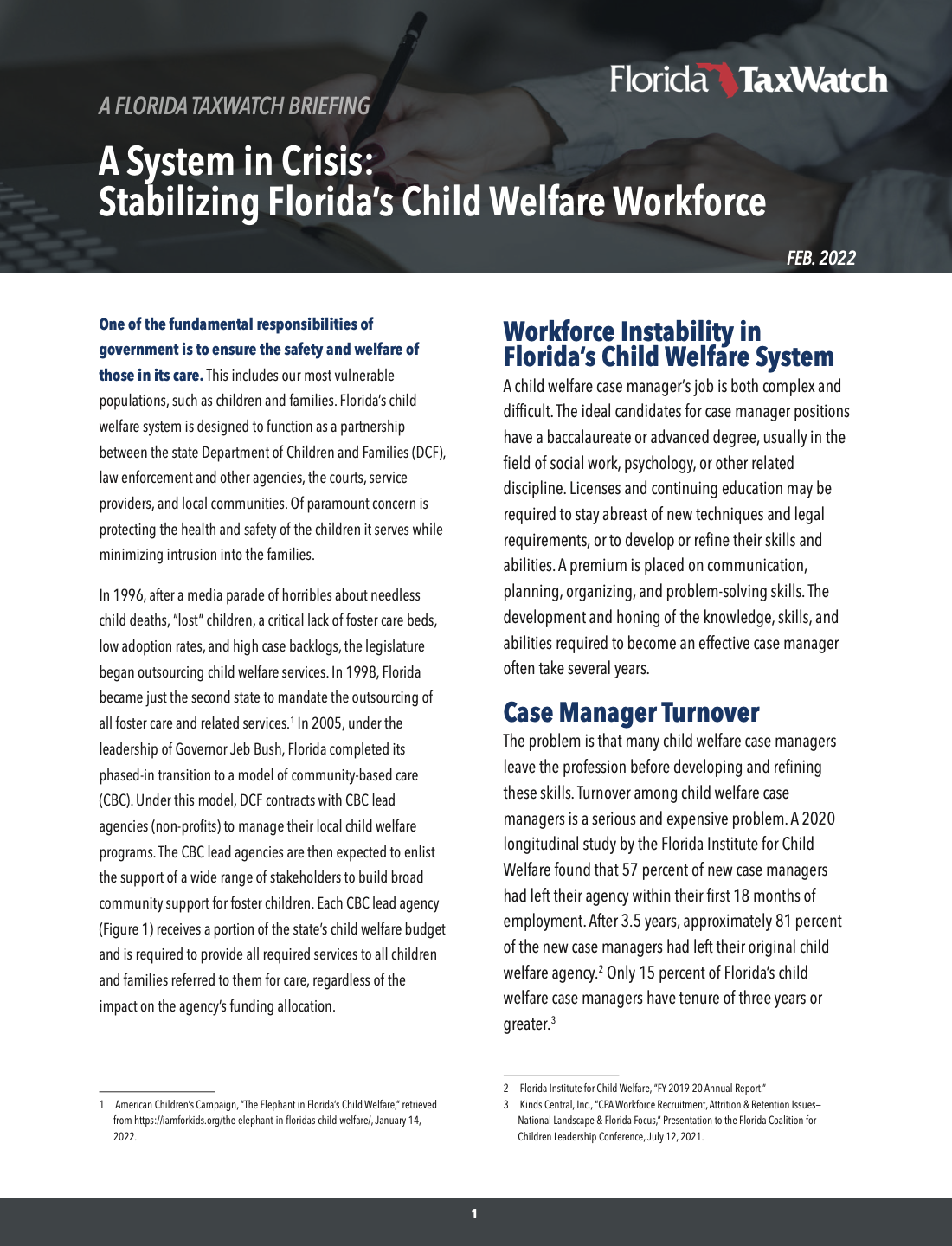A System in Crisis: Stabilizing Florida’s Child Welfare Workforce

One of the fundamental responsibilities of government is to ensure the safety and welfare of those in its care. This includes our most vulnerable populations, such as children and families. Florida’s child welfare system is designed to function as a partnership between the state Department of Children and Families (DCF), law enforcement and other agencies, the courts, service providers, and local communities. Of paramount concern is protecting the health and safety of the children it serves while minimizing intrusion into the families.
In Florida, DCF contracts with community-based care (CBC) lead agencies (non-profits) to manage their local child welfare programs.
A child welfare case manager’s job is both complex and difficult. The ideal candidates for case manager positions have a baccalaureate or advanced degree, usually in the field of social work, psychology, or other related discipline. Licenses and continuing education may be required to stay abreast of new techniques and legal requirements, or to develop or refine their skills and abilities. The development and honing of the knowledge, skills, and abilities required to become an effective case manager often take several years.
The problem is that many child welfare case managers leave the profession before developing and refining these skills. Turnover among child welfare case managers is a serious and expensive problem. A 2020 longitudinal study by the Florida Institute for Child Welfare found that 57 percent of new case managers had left their agency within their first 18 months of employment. After 3.5 years, approximately 81 percent of the new case managers had left their original child welfare agency. Only 15 percent of Florida’s child welfare case managers have tenure of three years or greater. Why then do so many case managers, many of whom undertake this profession because they genuinely want to help vulnerable children and their families, have such short tenures?
Components that contribute to workforce instability in Florida's Child Welfare System:
- Case Manager Turnover - In a 2021 survey of child welfare case managers, compensation (54 percent) and a lack of progressive salaries (68 percent) were identified by respondents as the top reasons for their job dissatisfaction. An annual case manager turnover rate of 50 percent, or greater, costs the state somewhere between $75.5 million and $150.9 million annually.
- Case Manager Caseloads - The Department of Children and Families recommends caseloads for case managers be capped at 10-12 children, six of the reporting lead agencies in Florida have average caseloads greater than 20 children per case manager.
- Pandemic induced unemployment rate increase - Case managers who are experiencing stress and burnout have employment options that will pay about what they are currently earning, but without the stress and burnout.
- Case Manager Compensation - Florida offers an average statewide starting salary of $37,064. Florida case manager salaries increase modestly to an average annual salary of $39,646, which is $9,173 (18 percent) below the national average of $48,859.
When a case manager leaves their job, the child welfare agency incurs costs associated with:
- Staff overtime, employee separation, and hiring/ training new staff;
- Increased paperwork and case management, emotional exhaustion, supervisors redirecting time to providing direct service;
- Processing changes in placement (staff meetings, new reports, identifying and placing a child in new placement, paperwork, etc.);
- Increased time in foster care as a result of reduced permanency and decreased chances of reunification;
- Recurrence of abuse and neglect, including the cost of investigation(s) and foster care placement(s); and
- Failure to meet established performance standards.
Looking forward:
A July 2021 Leadership Summit comprised of representatives from Florida’s child welfare community, state leadership, and policymakers developed a framework for advancing Florida’s system of child and family welfare. The Leadership Summit recognized the critical need to develop a model for case manager recruitment and retention that supports an “adequately compensated, well-trained, equipped, and supported workforce.” Strategies to develop this model include:
- Securing funding to ensure case managers are adequately compensated;
- Building and refining tools, testing, and screening assessments;
- Working to increase workforce stability by decreasing caseloads and enhancing supervisory culture; and
- Exploring the development of a salary progression model.